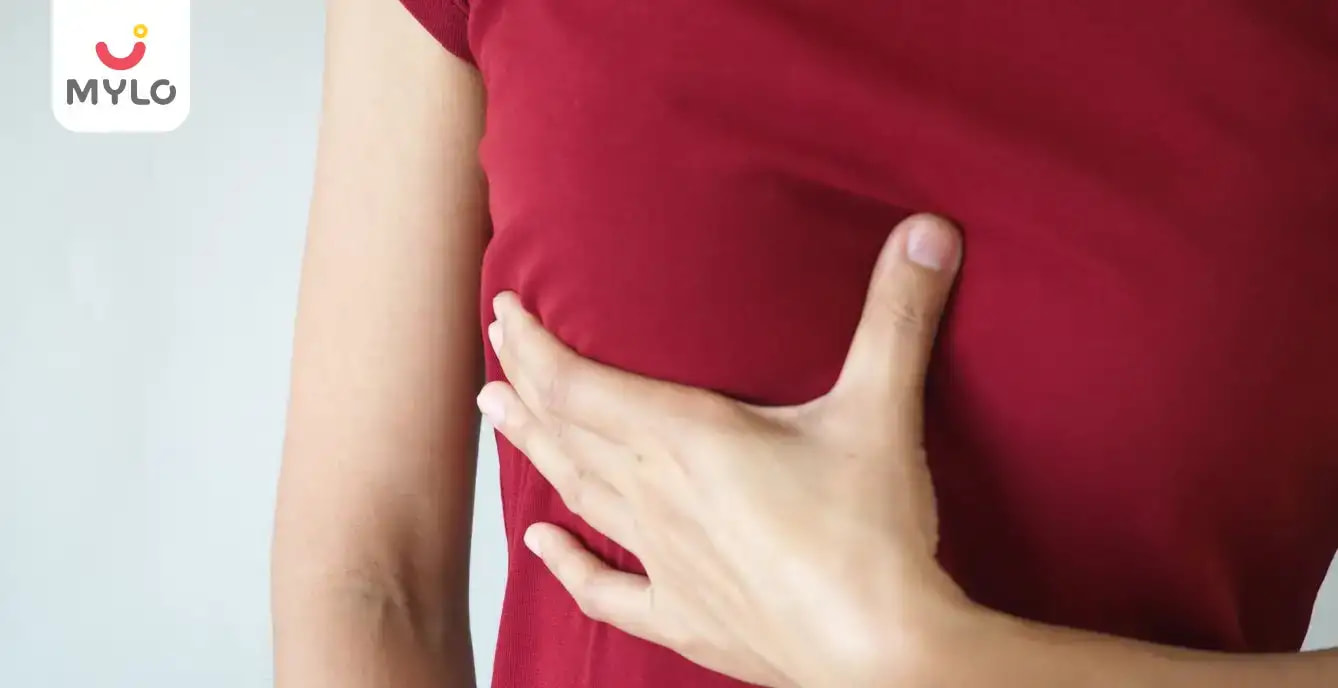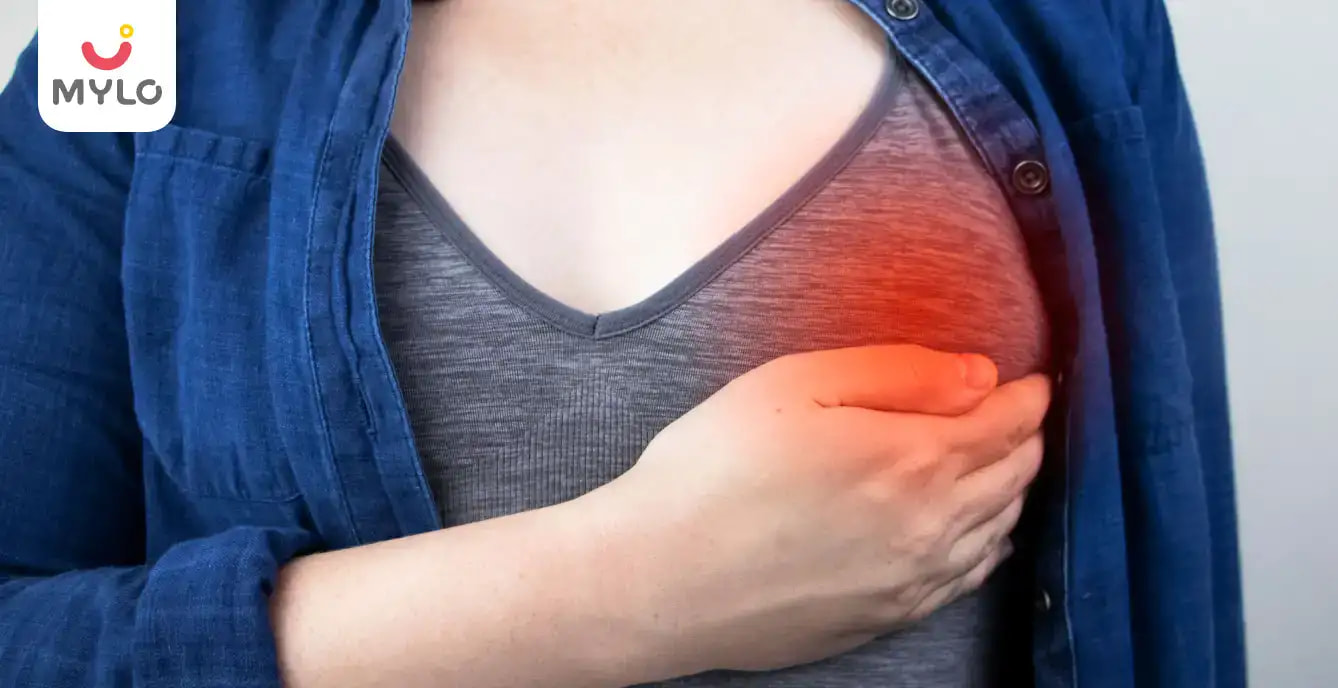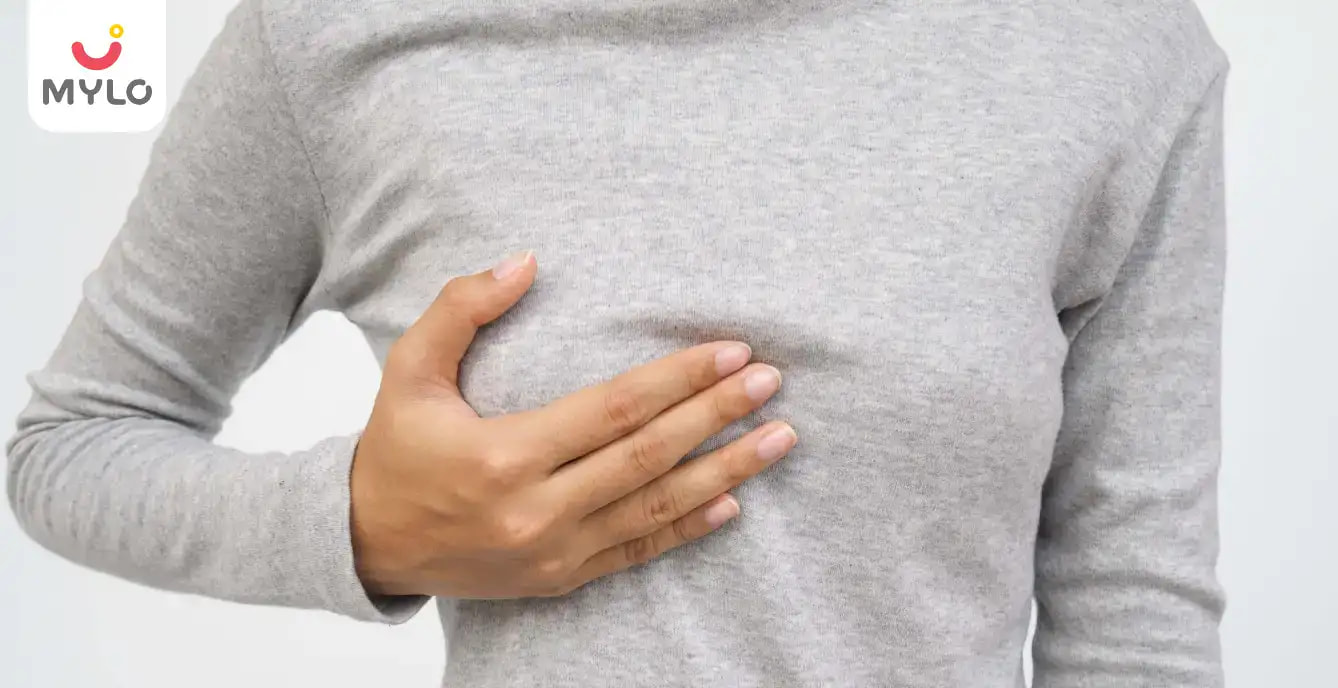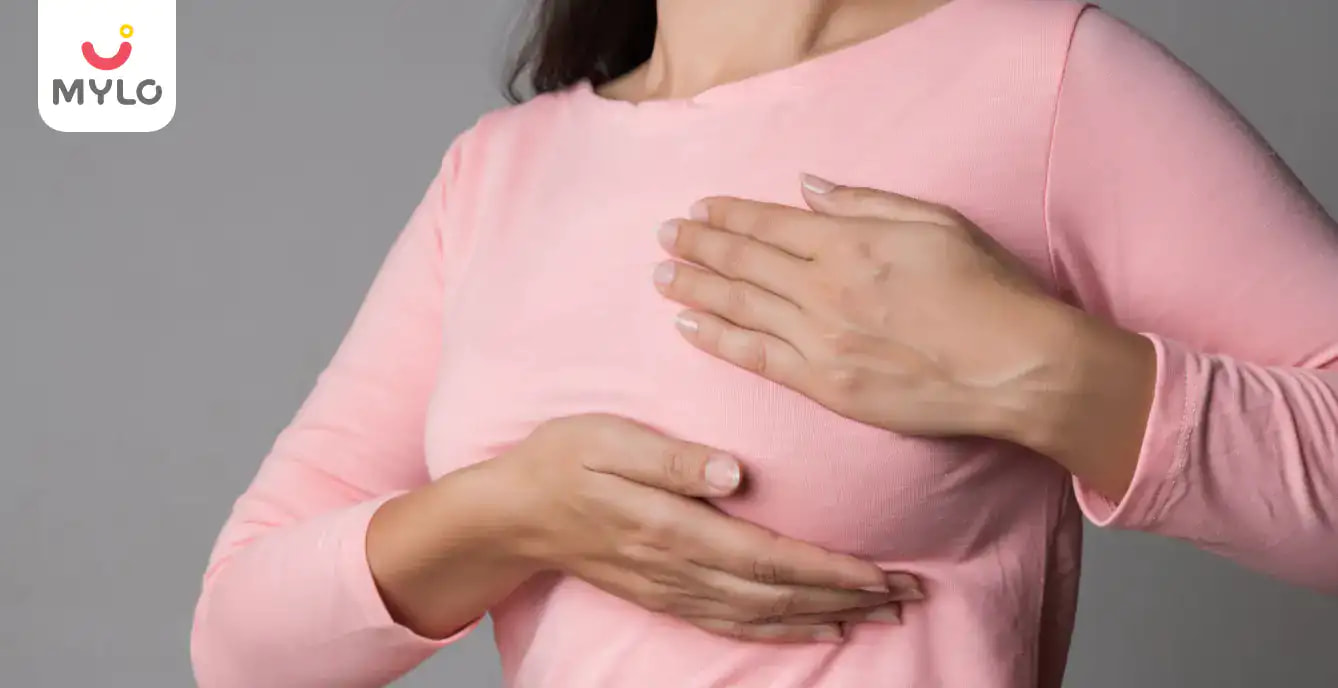Home

A Guide to Breast Infection: Symptoms, Causes, and Treatment Options
In this Article

Breast Lump
A Guide to Breast Infection: Symptoms, Causes, and Treatment Options
Updated on 3 November 2023
Breast infection is a painful and uncomfortable condition that many breastfeeding mothers face at least once in their lives. This article explores what causes this condition, its common symptoms, its treatment, and how to control it effectively.
What is Mastitis?
A breast infection, also known as mastitis, is a condition that can occur in breastfeeding women. A build-up of milk causes it in the breast, which can then become infected. Mastitis is a common breast infection that can occur in nursing mothers, but mothers who are not breastfeeding can also get it. Symptoms of mastitis include breast pain, redness, and swelling. The condition is usually caused by bacteria entering from the baby’s mouth to the mother’s breast through a crack in the nipple during breastfeeding. Mastitis can also occur if the milk ducts become blocked. Treatment of mastitis usually involves antibiotics and pain relief.
Common Symptoms of a Breast Infection
There are many different breast infection symptoms that women can experience. The most common symptom is usually pain in the breast, often described as a burning sensation. Some common mastitis symptoms include:
-
Rash on breast
-
Breast inflammation
-
Itching on breast
-
Nipple infection/nipple discharge
-
Tenderness in breast
-
Fever and chills
-
Swollen lymph nodes in the armpit
You may like: Breast Diseases: Types, Symptoms & Diagnosis
Causes of a Breast Infection
There are a few different causes of a breast infection or mastitis. The most common mastitis causes are bacteria (Staphylococcus aureus) getting into the breast through a crack in the nipple. This can happen when the nipple is cracked or damaged, or when the baby doesn’t latch on correctly.
Other causes of breast infection include a blocked milk duct or an injury to the breast. Sometimes, a foreign body, such as a piece of clothing, can cause an infection.
If one thinks one might have an infection, it’s important to see a doctor or lactation consultant as soon as possible. They will be able to prescribe mastitis antibiotics and help you clear up the infection.
Diagnosis of a Breast Infection
In most cases, a breast infection can be easily diagnosed by a healthcare provider. They will likely ask about the symptoms and perform a physical exam. They may also order a mammogram, biopsy, or ultrasound to rule out other causes of the symptoms, such as breast cancer or abscess. A mammogram uses x-rays to examine the breast tissue, whereas a biopsy requires small breast tissue that is clinically tested for any cancerous cell growth.
Treatment Options for Breast Infection
If a patient is diagnosed with a breast infection, they will likely be treated with antibiotics. The antibiotic course can be anywhere from 7 to 14 days long. This will help to clear the infection and relieve the symptoms. Patients should finish their antibiotics course, even if they start to feel better.
If someone has a breast infection, it is important to continue breastfeeding. This will help to clear the infection and prevent it from coming back. Another option could be to express breast milk to relieve the symptoms and prevent their baby from getting the infection.
In case of an abscess due to a severe breast infection, the doctor may have to clinically incise and drain the abscess to help the patient’s breast heal faster. Breastfeeding mothers may use a breastfeeding pump in case of severe infections when breastfeeding is extremely painful and uncomfortable.
Tips to Take Care of Breast Infection at Home
If someone is suffering from a breast infection, there are certain things they can do at home to help ease the symptoms and speed up the healing process. Here are some tips to take care of breast infections at home:
-
Rest and take it easy. This is important so that the body can focus on healing.
-
Apply heat to the affected area. This can help reduce pain and inflammation.
-
Wear loose, comfortable clothing. This will help reduce friction and irritation on the skin.
-
Keep the affected area clean and dry. This will prevent further irritation and infection.
-
Drink plenty of fluids. This will help flush out the toxins from your body and keep you hydrated.
-
Eat healthy, nutrient-rich foods. This will help your body to heal and fight off infection.
-
Take over-the-counter pain medication if needed. This can help to ease any pain and discomfort you may be experiencing.
-
See your doctor if your symptoms persist or worsen. They can prescribe antibiotics if needed.
By following these tips, new and experienced mothers can help speed up the healing process and treat any breast infection quickly.
References
- Boakes E, Woods A, Johnson N, Kadoglou N. (2018). Breast Infection: A Review of Diagnosis and Management Practices. NCBI
- Foxman B, D'Arcy H, Gillespie B, Bobo JK, Schwartz K. (2002). Lactation mastitis. NCBI



Written by
Ishmeet Kaur
Ishmeet is an experienced content writer with a demonstrated history of working in the internet industry. She is skilled in Editing, Public Speaking, Blogging, Creative Writing, and Social Media.
Read MoreGet baby's diet chart, and growth tips

Related Articles
Related Questions
Influenza and boostrix injection kisiko laga hai kya 8 month pregnancy me and q lagta hai ye plz reply me

Hai.... My last period was in feb 24. I tested in 40 th day morning 3:30 .. That is faint line .. I conculed mylo thz app also.... And I asked tha dr wait for 3 to 5 days ... Im also waiting ... Then I test today 4:15 test is sooooo faint ... And I feel in ma body no pregnancy symptoms. What can I do .

Baby kicks KB Marta hai Plz tell mi

PCOD kya hota hai

How to detect pcos

RECENTLY PUBLISHED ARTICLES
our most recent articles

Diet & Nutrition
গর্ভাবস্থায় আলুবোখরা: উপকারিতা ও ঝুঁকি | Prunes During Pregnancy: Benefits & Risks in Bengali

Diet & Nutrition
গর্ভাবস্থায় হিং | ঝুঁকি, সুবিধা এবং অন্যান্য চিকিৎসা | Hing During Pregnancy | Risks, Benefits & Other Treatments in Bengali

Women Specific Issues
স্তনের উপর সাদা দাগ: লক্ষণ, কারণ এবং চিকিৎসা | White Spots on Nipple: Causes, Symptoms, and Treatments in Bengali

Diet & Nutrition
গর্ভাবস্থায় পোহা: উপকারিতা, ধরণ এবং রেসিপি | Poha During Pregnancy: Benefits, Types & Recipes in Bengali

Diet & Nutrition
গর্ভাবস্থায় মাছ: উপকারিতা এবং ঝুঁকি | Fish In Pregnancy: Benefits and Risks in Bengali

Diet & Nutrition
গর্ভাবস্থায় রেড ওয়াইন: পার্শ্ব প্রতিক্রিয়া এবং নির্দেশিকা | Red Wine During Pregnancy: Side Effects & Guidelines in Bengali
- ইনার থাই চ্যাফিং: কারণ, উপসর্গ এবং চিকিৎসা | Inner Thigh Chafing: Causes, Symptoms & Treatment in Bengali
- গর্ভাবস্থায় ব্রাউন রাইস: উপকারিতা ও সতর্কতা | Brown Rice During Pregnancy: Benefits & Precautions in Bengali
- Velamentous Cord Insertion - Precautions, Results & Safety
- Unlock the Secret to Flawless Skin: 7 Must-Have Qualities in a Face Serum
- Unlock the Secret to Radiant Skin: How Vitamin C Serum Can Transform Your Complexion
- Gender No Bar: 10 Reasons Why Everyone Needs a Body Lotion
- Unlock the Secret to Radiant Skin How to Choose the Perfect Body Lotion for Your Skin Type
- Top 10 Reasons to Apply a Body Lotion After Every Bath
- Communication in Toddlers: Milestones & Activities
- How to Improve Vocabulary for Toddlers?
- A Comprehensive Guide to Understanding Placenta Accreta
- Vulvovaginitis in Toddlers Causes, Symptoms and Treatment
- A Comprehensive Guide to Understanding Cerebral Palsy in Children
- Bitter Taste in Mouth During Pregnancy: Understanding the Causes and Remedies


AWARDS AND RECOGNITION

Mylo wins Forbes D2C Disruptor award

Mylo wins The Economic Times Promising Brands 2022
AS SEEN IN

- Mylo Care: Effective and science-backed personal care and wellness solutions for a joyful you.
- Mylo Baby: Science-backed, gentle and effective personal care & hygiene range for your little one.
- Mylo Community: Trusted and empathetic community of 10mn+ parents and experts.
Product Categories
baby carrier | baby soap | baby wipes | stretch marks cream | baby cream | baby shampoo | baby massage oil | baby hair oil | stretch marks oil | baby body wash | baby powder | baby lotion | diaper rash cream | newborn diapers | teether | baby kajal | baby diapers | cloth diapers | laundry detergent 6472 | lactomama lactation granules |







